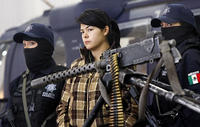-
Wolfhound sniffs out contraband cell phones
Wolfhound Cell Detector is a handheld, wireless sniffer specifically tuned to the RF signature of common cell phones; it helps universities, government and military installations, hospitals, law enforcement agencies, financial institutions, and prisons and correctional facilities enforce their No Wireless policies
-
-
Mexico to up security in border city after blasts
Following a series of explosions in downtown Reynosa, across the border from McAllen, Texas, the Mexican government is rushing reinforcements to the city; at the same time, thirty-five of the seventy-two bodies found in a mass grave on Saturday had been identified: sixteen Hondurans, thirteen Salvadorans, five Guatemalans, and a Brazilian; they were killed after refusing to cooperate with drug gangs
-
-
Drive-by full-body scanning
Massachusetts-based American Science & Engineering is selling van-mounted backscatter X-ray detection system to law enforcement; these vans can be driven past neighboring vehicles to see their contents
-
-
Police robot seeks out the bad guys
Police units in California use DHS grants to buy a robot to go into dangerous places to look for bad guys; the $12,000, 25-pound robot is waterproof, equipped with a 360-degree camera and tracks for movement; it climbs stairs, runs on grass and gravel, and can right itself if it flips over
-
-
Rayguns to be used in L.A. prisons
Officials at the Los Angeles County Jail have announced that the U.S. jails will deploy a new laser weapon to break up fights among jail inmates; the raygun, capable of producing a beam of up to 100 ft, will be positioned on the detention center’s ceiling and operated by using a computer monitor and a joystick
-
-
Businesses cope with Mexico security risks, pass costs to consumers
Faced with the threat of smuggling attempts by criminal organizations in Mexico, foreign companies are simply doing more, spending more, and in the process charging consumers more to shore up security in a country where killings, kidnappings, and extortions have become a part of daily life
-
-
New illegal immigration frontier: the sea

There is a new frontier for illegal immigrants entering the United States — a roughly 400-square-mile ocean expanse that stretches from a bullring on the shores of Tijuana, Mexico, to suburban Los Angeles; in growing numbers, migrants are gambling their lives at sea as land crossings become even more arduous and likely to end in arrest; while only a small fraction of border arrests are at sea; authorities say heightened enforcement on land, and a bigger fence are making the offshore route more attractive
-
-
Money smuggling across border grows despite increased enforcement
U.S. and Mexican law enforcement authorities only seize about 1 percent of cash from drug trafficking, despite increased efforts by both countries; stemming the flow of cash is vital to efforts by the United States and Mexico to take down drug cartels, as drug cartels depend on cash from wholesale drug sales to gangs in the United States
-
-
Mexico deploys Israeli UAVs in war on drug cartels

Since December 2006, nearly 30,000 Mexicans have been killed in that country’s increasingly vicious drug war; the relentless flow of guns from the United States into Mexico has significantly strengthened the drug cartels, allowing them not only to withstand the efforts by the Mexican authorities to impose law and order, but in many cases to take the operational initiative, making large swaths of the country ungovernable; the Mexican government, for its part, is bolstering its own capabilities: last year it has secretly purchased surveillance UAVs from Israel to perform monitoring tasks in border areas and near strategic installations in the country
-
-
Skeletal scans could be newest screening technique
The adult skeleton has 206 bones; size, shape, density, and joint structure make each skeleton slightly different; throw in an extra lumbar vertebrae or extra rib — which some people have — as well as previously broken bones, implants, screws, and other identifying characteristics, and the signatures become even more individual
-
-
Biggest mass graves linked to drug-related violence uncovered in Mexico
Seventy-two bodies found in a mass grave on a ranch in northern Mexico; in recent months an increasing number of mass graves have been discovered; in June, police recovered fifty-five bodies from an abandoned mine near Taxco, in Guerrerro state
-
-
Hagerstown PD disappears from analog scanners
Those wishing to listen in on Hagerstown Police Department calls will have to update their technology: the “patch” to the old 800 MHz frequency, which allowed simulcasting of calls on the old analog frequencies, was taken down last week
-
-
Mexican city is no longer safe for visitors, city's economic secretary says
The secretary of economic development of the Mexican city of Reynosa says the city can no longer guarantee the safety of its visitors amid recent fighting between the military and drug smuggling groups; the city’s burgeoning medical industry is only working at 25 percent of its capacity; “With this impact (the violence) everything went down to half,” the official said
-
-
Drug cartels employ women assassins (sicarias) in broad killing campaign

As the drug war in Mexico escalates, drug cartels have began to employ sicaria, or hit women; the women assassins, ranging in age from 18 to 30, work alongside men in cells of La Linea, as the Juárez drug cartel is known; cells are assigned to different jobs — such as halcones (lookouts), hit squads, and extortionists — and operate independently; the hit women are trained to use rifles and handguns and sometimes accompany their male counterparts; women in Juárez have been previously accused of being part of kidnapping rings, often assigned to keep watch on captives; women have also held roles as recruiters, transporters and leaders of drug-smuggling cells
-
-
Drug war fought with American weapons for the American market
Mexico’s drug war is fought with American weapons for the American market; of the 75,000 guns seized, 80 percent came from the United States; they are used to fight over an estimated $40 billion drug business — virtually all for the United States; last Year, at least 2,600 were killed in Mexico’s drug war, and the country is on track to top 3,000 this year
-
More headlines
The long view
How Male Grievance Fuels Radicalization and Extremist Violence
Social extremism is evolving in reach and form. While traditional racial supremacy ideologies remain, contemporary movements are now often fueled by something more personal and emotionally resonant: male grievance.
